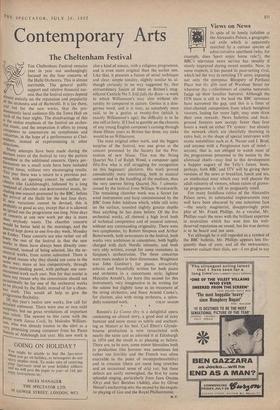Contemporary Arts
The Cheltenham Festival
THE Cheltenham Festival remains year in year out unchangingly focused on the four concerts of the Halle Orchestra. This is almost inevitable. The general public support and relative financial suc- cess that the festival enjoys depend
alrnnst entirely on the reputation and popularity of the orchestra and of Barbirolli. It is for them, arid not for the new works, that the pre- unminantly local audience fills the Town Hall on each of the four nights. The disadvantage of this 15 the undue emphasis of the festival on orches- tral music, and the temptation it offers to young ccirnPosers to concentrate on symphonies and concertos, in the hope of a performance at Chel- tenham, instead of experimenting in other directions.
Many attempts have been made during the
thirteen years of the festival to vary the pattern somehow in the additional concerts. Opera per- Lormances on a small scale have been included several times, without very encouraging results. -111, is year there was a return to a previous pat- `ern, with an opening concert by another or- chestra (the Goldsbrough), followed by a long Weekend of chamber and instrumental music, in- cluding one concertpromoted by the BBC, before Inc arrival of the Halle for the last four days. If new variations cannot be devised, this is probably as good as any, except that it is allowed Spread out the programme too long. Nine days of concerts at one new work per day is more than anybody wants. The chamber concerts "131.!ld be better held in the mornings, and the tteslIval kept down to one five-day week, Monday PridaY. These concerts are also rather cut off from the rest of the festival in that the new Works in them have always been directly com- m.issioned, instead of being selected, like the or- chestral works, from scores submitted. There is n° good reason why they should not come in the the Way, more or less competitively, through h
e score-reading panel, with perhaps one com-
missioned work each year. Nor for that matter is there any reason why the commission should not °e casionally be for one of the orchestral works to be played by the Halle, instead of for a cham- ber work. This would all help to give the Prqramme flexibility. Of. this year's twelve new works, few call for detailed comment. There were one or two mild S urprises but no great revelations of important flew talent. The nearest to this came with the st)tano work Janua Coeli, by Malcolm William- On, who was already known to the alert as a nverY promising young composer from his Piano Nnlata at Aldeburgh last year. His new work is GOING ON HOLIDAY?
also a kind of sonata, with a religious programme, and is even more original than the earlier one. Like that, it presents a fusion of serial technique and clear, simple tonality, slightly similar to, al- though certainly in no way suggested by, that extraordinary fusion of them in Britten's mag- nificent Canticle No 3, Still falls the Rain—a work to which Williamson's may also without ab- surdity be compared in stature. Genius is a dan- gerous word, and it is easy, as somebody once said, to be a genius at twenty-five (which is exactly Williamson's age); the difficulty is to be one still at forty. If I had to gamble on the chances of any young English composer's coming through those fifteen years as Britten has done, my stake would be on Williamson.
The most original other work, and the biggest surprise of the festival, was one given at the concert presented by the Society for the Pro- motion of new Music. This was the String Quartet No 3 of Ralph Wood, a composer aged fifty-five who is still struggling for recognition on this beginners' platform. His work proved considerably more interesting, both in musical content and in the handling of the medium, than the very uneven String Quartet No. 5 commis- sioned by the festival from William Wordsworth. The remaining chamber work was a Sextet for wind instruments and harp commissioned by the BBC from John Addison which, while still witty 'on the surface, sounded slightly greater depths than anything he has done before. Of the five orchestral works, all showed a high level both of technical competence and of musical interest, without any commanding originality. There were two symphonies, by Robert Simpson and Arthur Butterworth, both newcomers to the festival, both works very ambitious in conception, both highly charged with dark Nordic intensity, and both very ably written, except for some monotony in Simpson's orchestration. The three concertos were more modest in their dimensions. Weightiest was John Gardner's for piano, attractively eclectic and beautifully written for both piano and orchestra in a concertante style; lightest Malcolm Arnold's, for horn (his second for this instrument), very imaginative in its writing for the soloist but slightly tame in its treatment of the string orchestra; and finest Arnold Cooke's, for clarinet, also with string orchestra, a splen-






























 Previous page
Previous page